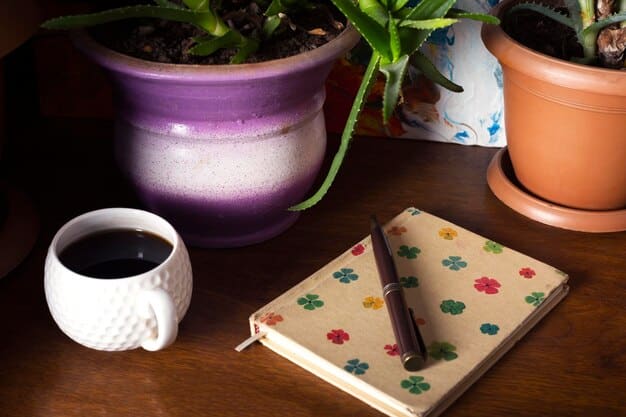Unlock Your Potential: Discover the Power of Journaling for Self-Awareness

Discover the Power of Journaling: A Simple Personal Growth Tool for Increased Self-Awareness offers a transformative approach to self-discovery, providing a structured way to explore thoughts, emotions, and experiences leading to greater clarity, understanding, and personal development.
Ready to unlock a powerful tool for personal growth? Discover the Power of Journaling: A Simple Personal Growth Tool for Increased Self-Awareness can revolutionize your understanding of yourself, leading to improved mental clarity, emotional regulation, and a deeper sense of purpose.
The Undeniable Benefits of Journaling for Self-Discovery
Journaling, often seen as a simple writing exercise, is, in reality, a potent method for exploring the depths of your own mind. It’s a space where you can freely express thoughts and feelings without judgment, fostering a deeper connection with your inner self and promoting significant personal growth.
This practice offers numerous benefits for self-awareness and overall well-being.
Enhanced Self-Reflection
Journaling encourages you to pause and reflect on your experiences, thoughts, and emotions. This process allows you to gain insights into your patterns, behaviors, and triggers, leading to a more profound understanding of who you are.
Improved Emotional Regulation
By expressing your feelings in writing, you can process and manage emotions more effectively. Journaling provides an outlet for releasing pent-up emotions, reducing stress, and promoting emotional balance.

- Reduced stress and anxiety
- Increased self-confidence
- Improved problem-solving skills
- Enhanced creativity and intuition
Regular journaling can be a powerful tool for cultivating a healthier and more fulfilling life.
Choosing the Right Journaling Method for You
There isn’t a one-size-fits-all approach to journaling; it’s a personal practice that should align with your preferences and goals. The key is to find a method that resonates with you and helps you explore your inner world effectively.
Here are a few popular journaling methods to consider:
Free Writing
This method involves writing continuously for a set period without worrying about grammar, structure, or content. It’s an excellent way to unleash your thoughts and explore unconscious patterns.
Gratitude Journaling
Gratitude journaling focuses on listing things you’re grateful for each day. This practice can shift your perspective towards positivity, increase happiness, and foster a sense of appreciation for the good things in your life.

- Identify triggers and patterns in your life
- Gain clarity on your values and beliefs
- Track your progress and growth over time
Experiment with different methods to discover what works best for you.
Setting Up Your Journaling Space for Success
Creating a conducive environment can significantly enhance your journaling experience. A designated space free from distractions can help you focus and fully immerse yourself in your thoughts and feelings.
Consider these aspects when setting up your journaling space:
Minimize Distractions
Choose a quiet and peaceful location where you won’t be disturbed. Turn off notifications on your phone and computer to avoid interruptions.
Create a Comfortable Atmosphere
Make your space inviting and comfortable by adding elements such as soft lighting, cozy seating, and calming scents like lavender or chamomile.
Morning Pages
Made popular by Julia Cameron in *The Artist’s Way*, morning pages involve writing three pages of stream-of-consciousness writing first thing in the morning. This tool helps unclog your mind and set a positive tone for the day.
Your physical environment can influence your mental state.
Practical Journaling Prompts to Spark Self-Awareness
Sometimes, the hardest part of journaling is knowing where to start. Journaling prompts can provide guidance and inspiration, helping you delve deeper into specific areas of your life and explore your inner landscape.
Here are some prompts to get you started:
What are you most grateful for today?
Take a moment to reflect on the things that bring you joy and appreciation. Focusing on gratitude can shift your mindset and improve your overall well-being.
What are your biggest fears and how can you overcome them?
Identifying your fears is the first step towards conquering them. Explore the root causes of your fears and brainstorm strategies for facing them head-on.
- What are your core values and how do you live by them?
- What are your strengths and how can you leverage them?
- What are your weaknesses and how can you improve them?
Don’t be afraid to get personal and honest in your reflections.
Overcoming Common Journaling Obstacles
Like any new habit, journaling can come with its challenges. It’s important to be aware of these obstacles and develop strategies for overcoming them to maintain a consistent practice.
Here are some common challenges and how to address them:
Lack of Time
Start with small increments of time, such as 5-10 minutes per day. Schedule journaling into your routine and treat it as a non-negotiable appointment with yourself.
Fear of Judgment
Remember that your journal is a private space for your eyes only. Free yourself from the need to be perfect and write without censoring your thoughts and feelings.
Directed Prompts
If you require a more direct approach, consider a method like the Bullet Journaling, which combines to-do lists, reflections, and goal setting into a single, organized notebook.
Consistency is key to reaping the benefits of consistent Journaling practice.
Transforming Your Life Through Consistent Journaling
The true power of journaling lies in its ability to transform your life over time. By consistently engaging in this practice, you can cultivate greater self-awareness, emotional intelligence, and personal growth.
Embrace the journey of self-discovery and unlock your full potential through:
Improved Relationships
By understanding yourself better, you can communicate more effectively and build stronger connections with others. Journaling can help you identify your needs and communicate them assertively, improving your relationships with loved ones.
Increased Creativity
Journaling can unlock your creative potential by providing an outlet for expressing your ideas and exploring new possibilities.
- Start small and be patient with yourself.
- Focus on the process, not the outcome.
- Be honest and authentic.
Make journaling a lifelong habit and watch how it transforms your life for the better.
| Key Point | Brief Description |
|---|---|
| ✍️ Self-Reflection | Gain insights into patterns, behaviors, and triggers. |
| ❤️ Emotional Regulation | Process and manage emotions effectively. |
| 🧘 Stress Reduction | Release pent-up emotions and reduce stress. |
| 🎯 Goal Setting | Track progress and achieve personal goals. |
Frequently Asked Questions (FAQ)
▼
Journaling offers numerous benefits, including increased self-awareness, improved emotional regulation, stress reduction, enhanced creativity, and better problem-solving skills. It’s a powerful tool for personal growth.
▼
The frequency of journaling depends on your personal preferences and goals. Some people journal daily, while others find that several times a week is sufficient. Consistency is key, so aim for a schedule you can maintain.
▼
You can write about anything that comes to mind, from your thoughts and feelings to your experiences and goals. If you’re unsure where to start, try using journaling prompts to guide your reflections. The beauty of a journal is that you have the freedom to say whatever you want.
▼
There is no right or wrong way to journal. The most important aspect of journaling is that it’s a personal and authentic practice. Experiment with different methods, styles, and prompts to find what works best for you. The freedom of journaling stems from simply being yourself through your writing.
▼
Journaling helps you become more self-aware by providing a space to reflect on your thoughts, emotions, and experiences. By regularly exploring your inner world in writing, you can gain deeper insights into your patterns, behaviors, triggers, and values.
Conclusion
In conclusion, journaling is a surprisingly versatile and powerful tool for personal growth and increased self-awareness. By dedicating time to consistent journaling, you can unlock a deeper understanding of yourself, improve your emotional well-being, and cultivate a more fulfilling and meaningful life. Embrace the journey and write your own story.





